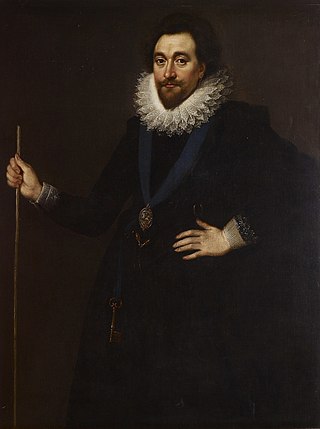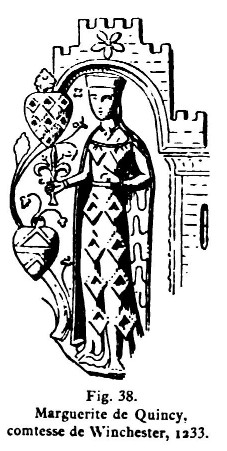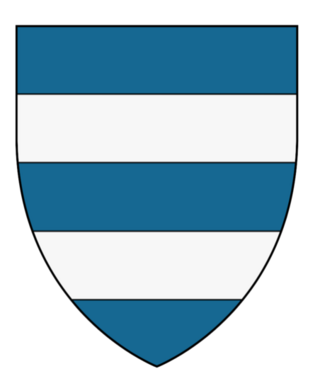Related Research Articles

William Marshal, 1st Earl of Pembroke, also called William the Marshal, was an Anglo-Norman soldier and statesman during High Medieval England who served five English kings of the Angevin Empire: Henry II and his son and de jure co-ruler Young King Henry, Richard I, John, and finally John's son Henry III.

Earl of Pembroke is a title in the Peerage of England that was first created in the 12th century by King Stephen of England. The title, which is associated with Pembroke, Pembrokeshire in West Wales, has been recreated ten times from its original inception. Due to the number of creations of the Earldom, the original seat of Pembroke Castle is no longer attached to the title.

Earl Marshal is a hereditary royal officeholder and chivalric title under the sovereign of the United Kingdom used in England. He is the eighth of the great officers of State in the United Kingdom, ranking beneath the Lord High Constable of England and above the Lord High Admiral. The dukes of Norfolk have held the office since 1672.

Sir Philip Sidney was an English poet, courtier, scholar and soldier who is remembered as one of the most prominent figures of the Elizabethan age.

Aymer de Valence, 2nd Earl of Pembroke was an Anglo-French nobleman. Though primarily active in England, he also had strong connections with the French royal house. One of the wealthiest and most powerful men of his age, he was a central player in the conflicts between Edward II of England and his nobility, particularly Thomas, 2nd Earl of Lancaster. Pembroke was one of the Lords Ordainers appointed to restrict the power of Edward II and his favourite Piers Gaveston. His position changed with the great insult he suffered when Gaveston, as a prisoner in his custody whom he had sworn to protect, was removed and beheaded at the instigation of Lancaster. This led Pembroke into close and lifelong cooperation with the king. Later in life, however, political circumstances combined with financial difficulties would cause him problems, driving him away from the centre of power.
Richard de Clare, 2nd Earl of Pembroke, also Lord of Leinster and Justiciar of Ireland, was an Anglo-Norman nobleman notable for his leading role in the Anglo-Norman invasion of Ireland. Like his father, Richard is commonly known by his nickname, Strongbow.

William Marshal, 2nd Earl of Pembroke was a medieval English nobleman and was one of the sureties of Magna Carta. He fought during the First Barons' War and was present at the Battle of Lincoln (1217) alongside his father William Marshal, 1st Earl of Pembroke, who led the English troops in that battle. He commissioned the first biography of a medieval knight to be written, called L'Histoire de Guillaume le Mareschal, in honour of his father.

William Herbert, 3rd Earl of Pembroke, of Wilton House in Wiltshire, was an English nobleman, politician and courtier. He served as Chancellor of the University of Oxford and together with King James I founded Pembroke College, Oxford. In 1608 he was appointed Warden of the Forest of Dean, Constable of St Briavels Castle, Gloucestershire, and in 1609 Governor of Portsmouth, all of which offices he retained until his death. He served as Lord Chamberlain from 1615 to 1625. In 1623 the First Folio of Shakespeare's plays was dedicated to him and his brother and successor Philip Herbert, 1st Earl of Montgomery.

The House of Clare was a prominent Anglo-Norman noble house that ruled the Earldoms of Pembroke, Hertford and Gloucester in England and Wales throughout its history, playing a prominent role in the Norman invasion of Ireland.

Richard Marshal, 3rd Earl of Pembroke, was the son of William Marshal, 1st Earl of Pembroke and brother of William Marshal, 2nd Earl of Pembroke, whom he succeeded to the Earldom of Pembroke and Lord Marshal of England upon his brother's death on 6 April 1231.

Addingrove is a former hamlet in Buckinghamshire, about 4 miles (6.4 km) northwest of the market town of Thame in neighbouring Oxfordshire. The settlement is on the B4011 road between Oakley and Long Crendon.

Gilbert Marshal, 4th Earl of Pembroke was the third son of William Marshal, 1st Earl of Pembroke and Countess Isabel, the daughter of Richard son of Gilbert, earl of Striguil. He was a member of the Marshal family.

Isabel de Clare, suo jure4th Countess of Pembroke and Striguil, was an Anglo-Norman and Irish noblewoman descended from Aoife Macmurrough and Richard de Clare and one of the wealthiest heiresses in Wales and Ireland. She was the wife of William Marshal, 1st Earl of Pembroke, who served three successive kings as Marshal of England. Her marriage had been arranged by King Richard I.

Stoke Lyne is a village and civil parish about 4 miles (6.4 km) north of Bicester, Oxfordshire in southern England.

Margaret de Quincy, suo jure 2nd Countess of Lincoln was a wealthy English noblewoman and heiress having inherited in her own right the Earldom of Lincoln and honours of Bolingbroke from her mother Hawise of Chester, received a dower from the estates of her first husband, and acquired a dower third from the extensive earldom of Pembroke following the death of her second husband, Walter Marshal, 5th Earl of Pembroke. Her first husband was John de Lacy, 2nd Earl of Lincoln, by whom she had two children. He was created 2nd Earl of Lincoln by right of his marriage to Margaret. Margaret has been described as "one of the two towering female figures of the mid-13th century".

The Battle of the Curragh was fought on 1 April 1234 on the Curragh plain in County Kildare, Ireland. The adversaries were men loyal to King Henry III of England on one side, and on the other side Richard Marshal, Earl of Pembroke and Lord of Leinster, who lost the battle and later died from the wounds he suffered. The battle was a small affair in the number of knights involved, but was still significant because it ended the career of the popular Richard Marshal.

Count of Longueville is a French noble title, whose holder had the fiefdom of the County of Longueville. The County was elevated into a Duchy in 1505.
Gervase of Melkley or Gervase of Melkeley was an Anglo-Norman scholar and poet.
Sir Robert de Berkeley, 3rd feudal baron of Berkeley was an Anglo-Norman baron and justice.

The Marshal family was a noble family of Anglo-Norman origins. Their name, Marshal, derives from the Frankish term for “a person who tended horses”. By 1066 the term was used for a position in royal and aristocratic households.
References
- ↑ Crouch, David (2004). "Marshal, William (I), fourth earl of Pembroke (c.1146–1219)" . Oxford Dictionary of National Biography (Online ed.). Oxford University Press. doi:10.1093/ref:odnb/18126 . Retrieved 2013-11-05.(Subscription or UK public library membership required.)
- ↑ "The History of English Poetry, from the Close of the Eleventh Century to the Commencement of the Eighteenth Century to Which are Prefixed Three Dissertations...: 1". 1840.
- ↑ Brand, Peter (1999). Pertile, Lino (ed.). The Cambridge History of Italian Literature. Cambridge University Press. ISBN 0-52166622-8.